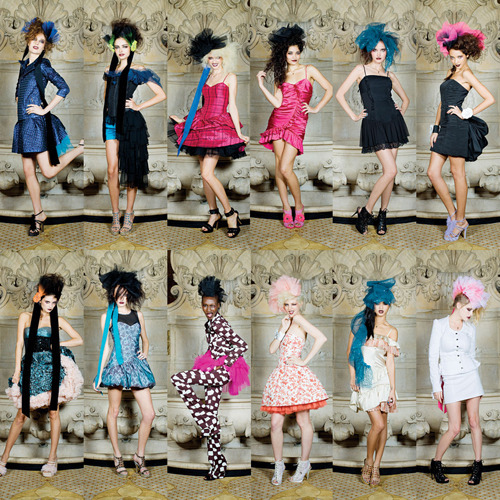Betsey Johnson, a designer who once stood for femme 80s/90s quirk, files for bankruptcy! Like a bite of some oversweet rose-scented madeline, this has propelled me a la recherche au temps perdu. Johnson herself is 70 this year and, admittedly, the brand has stopped being as revolutionary as it once was. But in the 80s and 90s, she was one of the femmiest femmes out there designing, and I could regularly be found up to my elbows in the sale basket at the the Philly Betsey Johnson boutique. I even got married in a Betsey Johnson dress of deep red velvet.
Loving a designer is an ambivalent experience. Aspirational, expensive, worrisome. Will they go away? Will their construction go down the tubes? Will you grow apart? The best that can come of it is confidence in the present day and memories later on. The blogger Gala Darling did a lovely post with glimpses of Betsey’s mercilessly feminine apartment and links to more about her.
Pinpointing that former boutique, and looking at some older Betsey Johnson clothes – in retrospect, much plainer than I remembered - unleashed a wave of nostalgia for my Philadelphia years. Did I love the clothes, or where I was when I was wearing them? I was young and clumsy and dorky when I rifled through the sale baskets at 18th and Walnut. I didn’t make a lot of money, but in 1994 Philly, you didn’t have to. Chasing temps perdu online, I found out that the tiny building where I had my first-ever apartment, on Quince Street in Philadelphia, is for sale. I already knew that one of the three miniscule apartments in the building (the one directly below mine – I was on the middle floor) got profiled on Apartment Therapy. I left a long and delirious comment.
To blow my mind further, somebody recently did a video praising Quince Street as a favourite place in the city. I could walk back down the uneven cobblestones of Quince Street today, shaded by slow-growing gingko and pear trees, and it still looks exactly the same as it did in 1994.
If you’ve never loved a city – I feel sorry for you – it’s like never having loved a person, or an animal. What is it like to love a city passionately? I felt like I knew everyone, or a subsection of everyone – a delicious fallacy. I checked out the alleyways and the scary-looking restaurants and bars, carrying away new places to go as urbanite trophies. On my rambles, I learned to love vintage: quirky unchanged lunch counters, stoop sales with Art Deco fragments and old magazines, closing-down stocking wholesalers selling me 1950s boxes of seamed nylon stockings for $3 apiece (“Nobody wants them anymore” they said). I huffed the smell of the sidewalks in the rain. I had my heart broken in that real-estate way, with an apartment broken into at one time, a bad encounter that shadowed the street where I lived another. Still, when I was coming back, I’d see the skyline and smile, involuntarily. And then one day I was done, we were over. Even the sidewalks stopped having their gravitational pull. I realized that I’d lived in that town and its environs for ten years and spent a sum total of eight weeks away. The rest of the world beckoned.
In the present day, I love Wellington, too, though not with that first-urban-love intensity. (Also, I live in the ‘burbs, and Wellington is ruthless towards its surrounds.) As a sign of my being at home in downtown Wellington, I felt a twinge when the Calendar Girls strip palace took over from the former Garden Club. The Garden Club was one of those large, indifferent, but available-for-burlesque venues. Its backstage stairs were horrible to high-heeled performers, its barnlike size didn’t encourage after-partying, and the seating was plentiful but good views weren’t. Nobody liked it much, until it wasn’t ours anymore. At least it’s ending on an interesting story. I think that in the age of Internet porn, there is something to be said for human beings leaving the house to look at and speak to actual women instead of airbrushed pixels. Those “dirty” urban zones were part of what gave Philly its rough-edged flavor. Will Calendar Girls be successful in this city and era, or, two years from now, will we be pouting at a glossy, dull fusion restaurant and saying “That used to be a strip club! Remember the time we…?â€

Pingback: Travel: Philadelphia Freedom | Ever So Scrumptious